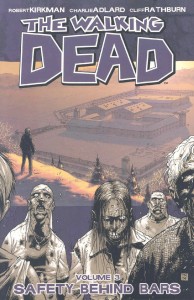 Back-to-back zombies! Pretty gross, right? Luckily, I mean books, not literal zombies. Although I suppose face-to-face or side-by-side would not be less icky, all things considered. Though probably less dangerous; who wants 360 degrees of brain-eating action coming at them? Since zombiism has not been romanticized the way that vampirism has: nobody, that’s who!
Back-to-back zombies! Pretty gross, right? Luckily, I mean books, not literal zombies. Although I suppose face-to-face or side-by-side would not be less icky, all things considered. Though probably less dangerous; who wants 360 degrees of brain-eating action coming at them? Since zombiism has not been romanticized the way that vampirism has: nobody, that’s who!
All of which is a roundabout way of mentioning I read another Walking Dead graphic novel. I’m seriously starting to appreciate the choice to present these in black and white. Images that would be over the top in color are appropriately horrible without; if pressed into guesswork, I’d say because the lack of red everywhere draws my attention back to the line-work. And there was a lot of horrible to behold. As the title indicates, Rick Grimes and company have finally found their shot at safety: a prison. Sure, it’s full of zombies now, but careful application of force can see it emptied out, leaving multiple security measures in place to prevent more of the undead from entering the grounds, ample space to spread out and form a community instead of a cluster of over-crowded and increasingly disaffected-with-each-other survivors, and more than enough open land to begin farming and herding while the weather holds. In short, it’s a latter-day paradise. Except… well, any details beyond that there’s a catch would be telling.
In short, I feel like it’s possible to view volume 2 as the transition novel I claimed it would be. Appropriate themes are back in full force in this story, and to shocking degree. (No lie: at one point, my jaw dropped open in surprise at a turn of events.) The tagline for the series claims, “in a world ruled by the dead, we are forced to finally begin living.” This is true, and it’s the one thing that I like the most in the entire disasturbation genre. But the additional theme that shows most strongly in zombie stories is that other people are far more dangerous those who survive the initial outbreak than zombies will ever be. I dig that one almost as much, which possibly is a reflection of my cynical nature. Be that as it may, my point here is that the author is not holding back anything in this particular regard.
Finally, a dislike. Rick’s pregnant wife is beginning to have real problems with both his assumption of the leadership position as well as with his choices as leader. It’s a little hard to watch, since I’m starting to actively like both characters. (Not Teckla hard, but hard.) But it’s really good character conflict, and I want to see where it leads, right? Except, they’ve spontaneously defused the tension via her admission that the pregnancy hormones are making her say things she really doesn’t mean, and she can see herself stepping over the line but is unable to prevent it. And I’m suddenly disappointed, both from the cessation of storyline possibilities and from the somewhat insulting explanation. I grant that hormones can run wild in fact, but having them do so in fiction with no consequences is both a cop-out and a little bit… well, not misogynistic per se, but at least anti-feminist, without even the excuse of it changing the plot in an important way. My only hope right now is that something will still come of these arguments, and she’s been exaggerating the hormonal excuse in a misguided attempt to be conciliatory and stop the hostilities instead of actually hashing things out.